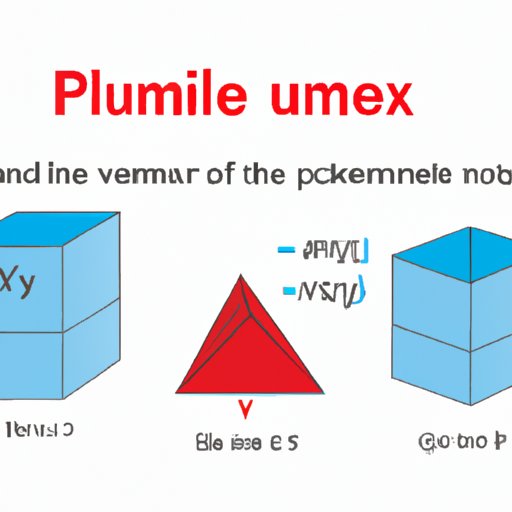
Introduction
Calculating the volume of a pyramid is a fundamental skill in many fields, including architecture, construction, and engineering. Whether you need to calculate the amount of material needed for a pyramid-shaped roof or determine the volume of a package for shipping, knowing how to find the volume of a pyramid is essential. In this article, we will provide step-by-step instructions on how to find the volume of a pyramid, along with real-world examples and variations on the basic formula to provide a comprehensive understanding of the topic.
Definition and Properties of a Pyramid
A pyramid is a polyhedron with a polygonal base and triangular faces that meet at a single point, called the vertex. The base can be any polygon, including a square, triangle, or pentagon, and the height is the distance from the vertex to the base. The properties of a pyramid depend on its base and height, including the number of faces, edges, and vertices.
Formula for Finding the Volume of a Pyramid
The formula for finding the volume of a pyramid is one-third base area times height, or V=(1/3)Bh. The variables in the formula are the base area (B) and height (h). To use the formula, follow these steps:
- Measure the length of one side of the base and the distance from the base to the vertex to determine the value of h.
- Calculate the area of the base (B) by using the appropriate formula for the polygon.
- Multiply the base area by the height and then divide by three to get the volume of the pyramid.
Real-World Examples of Using the Volume of a Pyramid
The formula for finding the volume of a pyramid is useful in many fields, including architecture, construction, and engineering. For example, to determine the amount of material needed for a pyramid-shaped roof, you would need to calculate the volume of the pyramid. In shipping, calculating the volume of a package can help determine the shipping costs. The formula is also used in the manufacturing of pyramidal structures, such as speakers and helmets.
Visual Aids for Understanding the Formula
To help visualize each step of the process, it can be helpful to use images, diagrams, animations, or videos. For example, a 3D representation of a pyramid and how to find its volume can be beneficial in understanding the concept. Additionally, showing how the formula changes when the base or height varies can help solidify the formula and ensure accuracy in calculations.
Variations on the Basic Formula
In addition to the basic formula for finding the volume of a pyramid, there are variations for calculating the volume of a truncated pyramid or a pyramid cut off at a certain height or angle. To calculate the volume of a truncated pyramid, use the same formula but with the new base area. To find the volume of a pyramid cut off at a certain height or angle, calculate the volume of the smaller pyramid and subtract it from the volume of the original pyramid.
Conclusion
Knowing how to find the volume of a pyramid is crucial for many fields, including architecture, construction, and engineering. The formula for finding the volume of a pyramid is straightforward and can be accomplished using a few simple steps. Don’t shy away from practicing the formula using various examples and exploring variations to gain a more robust understanding of the topic.





